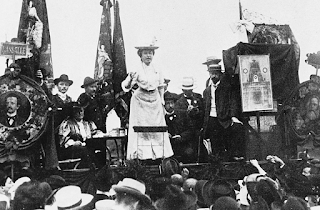Many of you celebrate the women in your lives (or the women you admire) during International Women's Day on March 8.
But did you know that the origins of this global day of observance can be at least partially traced back to German women?
The earliest Women's Day was held in New York City in 1909 in concurrence with an 11-week strike for women's rights, but it wasn't until 1910 that other countries got involved. In August of that year, an International Socialist Women's Conference was organized in Copenhagen, Denmark.
During this meeting, German Socialists Luise Zietz, Clara Zetkin and Käte Duncker advocated for the establishment of an annual Women's Day. They had been inspired by the American observance during the prior year. "When the men are silent, it is our duty to raise our voices on behalf of our ideals," Zetkin said.
One year later, on March 19, 1911, the world's first International Women's Day was marked, with participating countries including Austria, Denmark, Germany, and Switzerland (the United States held its observance on a different day). Women in Europe took to the streets with posters and signs, advocating for their right to vote and hold office, among other topics.
Although several women played a role in the establishment of International Women's Day, Zetkin is perhaps the most well-known. Zetkin was active in the Social Democratic Party of Germany, the Independent Social Democratic Party of Germany and later the Communist Party of Germany, which she represented during the Weimar Republic from 1920 to 1933.
Although the roots of International Women's Day were tied to socialism, the day of observance has evolved over time. This changed when the United Nations began celebrating the day in the year 1975 (the "International Women's Year"). Two years later, the UN General Assembly invited all of its member states to declare March 8 as the UN Day for women's rights.
At the German Embassy in Washington, we have many wonderful women in leadership positions - including our very own German Ambassador, Emily Haber!
To celebrate Women's History Month, a group of us will be running a 5K on the National Mall this weekend, alongside our EU colleagues and American friends. Called the "Her Story 5K", this run recognizes the accomplishments of women across the world. Take a look at the articles in this week's edition of TWIG to read more about some of the women who have changed the world we live in today.
Nicole Glass, Editor, The Week in Germany
This is Rosa Luxemburg, also an early icon of the Women's Movement. The picture is from the book: Kurt Tucholsky: The Short Fat Berliner Who Tried to Stop A Catastrophe With A Typewriter, by Harold L. Poor, about the Weimar Republic.

